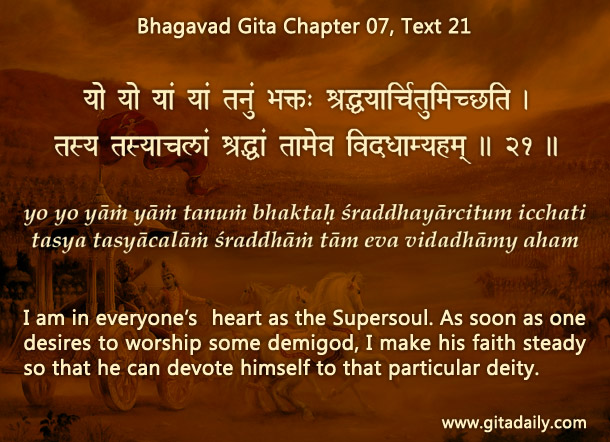When we study scripture, our preconceptions often act as a subconscious filter. This filter highlights those parts of scripture that confirm our conceptions and downplays those parts that confound our conceptions. After such study, we may think we know scripture, but we don’t. To actually know scripture, we need to look at our preconceptions through scripture, not look at scripture through our preconceptions.
Consider a Bhagavad-gita teaching that is often reduced and distorted by people’s preconceptions: the Gita’s vision of the divine. Some people who consider the Hindu tradition to be polytheistic hold that the Gita, being a Hindu scripture, teaches polytheism. And they highlight verses wherein the Gita talks about multiple gods (07.20-23). Others who consider the Hindu tradition monistic argue that such Gita references to many gods point to the temporality of all objects of worship: ultimately, the worshiper and the worshipped unite in an undifferentiated oneness; and the various gods are interchangeable objects for intermediate meditation.
But what is the Gita’s actual vision of divinity? It’s a sophisticated theological structure that can be called polymorphic monotheism. Monotheism because it refers to one ultimate reality, who is neither personal like us nor impersonal; that reality is trans-personal, being a personality that is transcendental to the limitations that beset all mundane personalities. And polymorphic because that ultimate reality has many manifestations. These manifestations exist at different levels, with different degrees of power, and they attract godless souls of various mentalities to progress toward God-consciousness. The powers of these manifestations (or deities) come from the Ultimate (Bhagavad-gita 07.21), as do the deities themselves (10.02).
This remarkable vision of divinity is a small sample of the profound knowledge that scripture shares with those who can put aside their own filters.
Think it over:
- How do our preconceptions affect our scriptural study?
- What is the Gita’s vision of the divine? How is it often distorted?
- What conceptions do you hold strongly? How do they affect your scriptural study?
***
07.21 I am in everyone’s heart as the Supersoul. As soon as one desires to worship some demigod, I make his faith steady so that he can devote himself to that particular deity.
To know more about this verse, please click on the image
Explanation of article:
Podcast:


Thank you for making so clear this most intimate and confidential and precious knowledge! We are so blessed to have your association. Haribol!!! 🙏🏽
Happy to be of service.
How do you do this? Every day you share a nugget of spiritual wisdom. I look forward to your posts and thank Krishna for your service which helps weak minded people like me!
Thanks for your effusive appreciation; somehow, it is Krishna’s mercy to engage my linguistic-intellectual conditioning in his service.